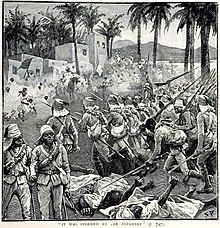Battle of Ferkeh
| Battle of Ferkeh | |||||||
|---|---|---|---|---|---|---|---|
| Part of the Mahdist War | |||||||
 Anglo-Egyptian troops storm the village of Ferkeh (illustration from a British book) | |||||||
| |||||||
| Belligerents | |||||||
| Commanders and leaders | |||||||
Osman Azrak Hammuda (KIA) | Sir Herbert Kitchener | ||||||
| Strength | |||||||
3,000–4,000 men | 9,000–9,500 men | ||||||
| Casualties and losses | |||||||
44 emirs killed 4 emirs captured 800–1,500 soldiers killed 500 soldiers wounded 500–600 POWs | 20 soldiers killed 81–83 soldiers wounded | ||||||
The Battle of Ferkeh (or Firket) occurred during the Mahdist War when an army of the Mahdist Sudanese was surprised and routed by British-led Egyptian forces under Sir Herbert Kitchener on 7 June 1896. It was the first significant action of the reconquest of Sudan that culminated in the Battle of Omdurman in September 1898.
In June 1896, at the commencement of the Sudan campaign, Kitchener's Anglo-Egyptian force was advancing on Dongola, in Northern Sudan. Ferkeh was a small fortified village on the banks of the Nile. It was the first important Mahdist position they encountered. At the time, it was occupied by 3,000 Mahdist warriors, led by the Emirs Hammuda and Osman Azrak.[1]
Kitchener's force, nominally in service of the Khedive of Egypt, but in fact under direct British control, was composed of Egyptian and Sudanese soldiers, led by British officers. It numbered 9,000 men, accompanied by three batteries of field guns and one battery of Maxim guns.[2] Apart from officers with the Egyptian Army, the Maxim battery were the only European troops present, being manned by detachments from the North Staffordshire Regiment and the Connaught Rangers.[3] The latter, according to some sources, were wearing red coats not khaki. If so, this was the last occasion that British troops fought in red (however, most sources say the last occasion this happened was at the Battle of Ginnis on 30 December 1885).[citation needed]
Kitchener divided his force into two columns. One was formed mostly of infantry, and had to march along the Nile to attack Ferkeh from the North. The other consisted of cavalry, camel-mounted infantry and horse artillery units and was sent through the desert to attack from the South-East. Both columns departed in the evening of the 6th, and marched through the night, deploying at dawn in the morning of the 7th.[4]
The attack caught the Mahdists completely by surprise, and they made only uncoordinated attacks against the deploying Egyptians, during which Emir Hammuda was killed. Many of the Mahdists then turned and fled. The cavalry column should have cut off their retreat, but they were hidden from view by the terrain and many, including Osman Azrak, made good their escape along the Nile. Other Mahdists stayed in their fortifications in the village, and fought to the end. The Egyptians had to clear the position with bayonets.[4]
The battle lasted less than three hours – from 04:30 to 07:20 – and resulted in the deaths of 20 Egyptians and 800 to 1,000 Mahdists.[4]
In strategic terms, Ferkeh was not a major battle – an outpost of the Mahdist Empire had been surprised and overrun. However the battle had a significant psychological effect. It was the first substantial victory of the Egyptian Army since it had been re-organised by the British, and showed that the Mahdist forces could be defeated. This boosted the Egyptian Army's morale, and unsettled their opponents, at the onset of the re-conquest campaign.[5]
Those present were later awarded the Khedive's Sudan Medal with clasp 'Firket', and Queen Victoria's Sudan Medal.[3]
References
^ Barthorp, page 139.
^ Churchill, page 222.
^ ab Joslin, page 181.
^ abc Churchill, pages 225-233.
^ Ziegler, pages 22-23.
Bibliography
- Barthorp, Michael. (1984), War on the Nile, Blandford Press, London .mw-parser-output cite.citation{font-style:inherit}.mw-parser-output .citation q{quotes:"""""""'""'"}.mw-parser-output .citation .cs1-lock-free a{background:url("//upload.wikimedia.org/wikipedia/commons/thumb/6/65/Lock-green.svg/9px-Lock-green.svg.png")no-repeat;background-position:right .1em center}.mw-parser-output .citation .cs1-lock-limited a,.mw-parser-output .citation .cs1-lock-registration a{background:url("//upload.wikimedia.org/wikipedia/commons/thumb/d/d6/Lock-gray-alt-2.svg/9px-Lock-gray-alt-2.svg.png")no-repeat;background-position:right .1em center}.mw-parser-output .citation .cs1-lock-subscription a{background:url("//upload.wikimedia.org/wikipedia/commons/thumb/a/aa/Lock-red-alt-2.svg/9px-Lock-red-alt-2.svg.png")no-repeat;background-position:right .1em center}.mw-parser-output .cs1-subscription,.mw-parser-output .cs1-registration{color:#555}.mw-parser-output .cs1-subscription span,.mw-parser-output .cs1-registration span{border-bottom:1px dotted;cursor:help}.mw-parser-output .cs1-ws-icon a{background:url("//upload.wikimedia.org/wikipedia/commons/thumb/4/4c/Wikisource-logo.svg/12px-Wikisource-logo.svg.png")no-repeat;background-position:right .1em center}.mw-parser-output code.cs1-code{color:inherit;background:inherit;border:inherit;padding:inherit}.mw-parser-output .cs1-hidden-error{display:none;font-size:100%}.mw-parser-output .cs1-visible-error{font-size:100%}.mw-parser-output .cs1-maint{display:none;color:#33aa33;margin-left:0.3em}.mw-parser-output .cs1-subscription,.mw-parser-output .cs1-registration,.mw-parser-output .cs1-format{font-size:95%}.mw-parser-output .cs1-kern-left,.mw-parser-output .cs1-kern-wl-left{padding-left:0.2em}.mw-parser-output .cs1-kern-right,.mw-parser-output .cs1-kern-wl-right{padding-right:0.2em}
ISBN 0713713100
- Bruce, George. (1981), Harbottle's Dictionary of Battles, Van Nostrand Reinhold (
ISBN 0-442-22336-6). - Churchill, Winston S. (1899), The River War - an account of the Reconquest of the Sudan, volume I, Longmans, London.
- Joslin, Litherland and Simpkin (eds). (1988), British Battles and Medals, Spink
ISBN 0907605257
- Ziegler, Philip (1974), Omdurman, Collins, London ISBN 00021161210
External links
Churchill, Winston S (1899). "The River War Volume 1". Longmans. Retrieved 2018-11-03.
"Hot fighting at Ferkeh; How the Sirdar surprised and routed the Mahdi's Emirs" (PDF). The New York Times. July 12, 1896. Retrieved 2007-11-14.